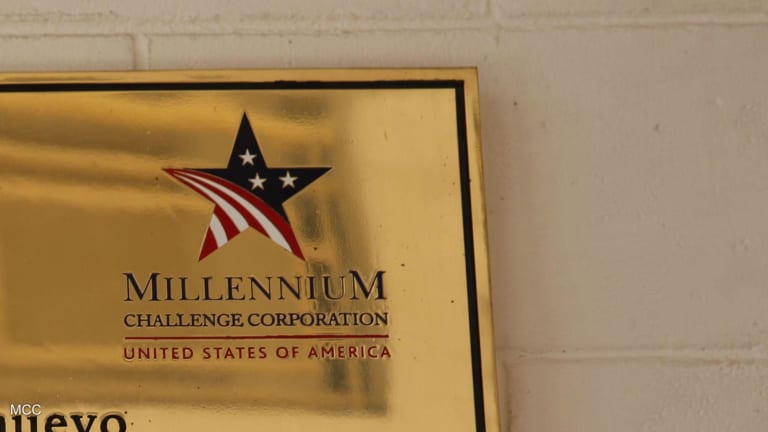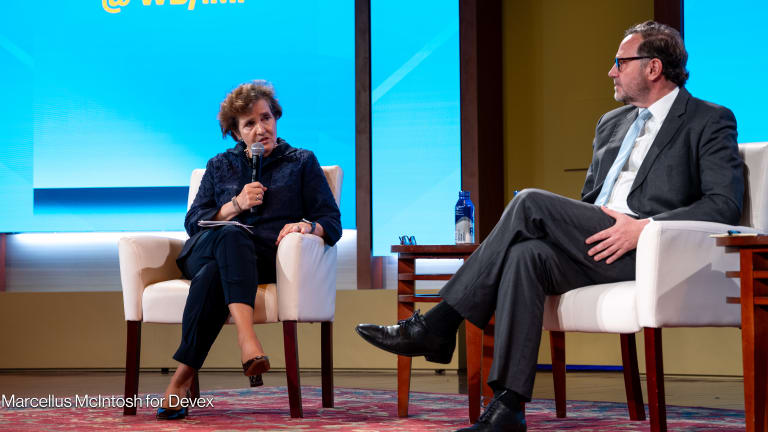In recent years
has served as Africa's poster child for good governance and economic growth. The
is now joining that chorus.
Ghana's five-year, $547 million MCC compact started in February 2007 and is the third-largest to date behind Tanzania ($698 million) and Morocco ($697.5 million). With 28 months left to go, the compact is showing signs of success, raising questions about the possibility of a follow-up compact with the U.S. government corporation.
Of the total amount allocated, 57 percent has been committed to projects, and 16 percent has been expended. By the end of the fiscal year, 80 percent of the funding is expected to be committed, with 45 percent of the funds dispersed.
While Ghana has low scores in managing inflation and administering fiscal and trade policies, it has high percentile rankings in democracy in comparison to its peer group.
"I'm really excited about Ghana, and I've been excited about Africa for the last 20-odd years," said James Bednar, MCC's resident country director for Ghana. "What's exciting now is we have a lot to show on the ground."
With projects in agriculture, transportation and rural development, the integrated compact has one main objective: to strengthen value chains in Ghana's predominant sector, agriculture.
Agriculture projects are underway throughout the country, with a focus on vegetables, pineapples and papaya in the export-oriented south, and maize and rice in the subsistence-based middle and northern belts.
Credit amounting to $20 million has gone out to farmers, with women making up 30 percent of the recipients. In the area of land ownership, a recent pilot program gave out first rural land title registrations to 103 farmers, 29 of whom were woman.
In addition to providing credit and starter packs with seeds and fertilizers, developing irrigation schemes, and building feeder roads and post-harvest storage facilities, the MCC compact trains Ghanaian farmers to think like entrepreneurs.
"All of them are trained in understanding the value chain approach and looking for opportunities in the market," Deputy Resident Country Director Katerina Ntep explained.
So far, the approach seems to be working. After being trained, a group of cassava and plantain farmers in the Afram plain area decided to experiment with chili peppers. They sought out potential export companies, and four expressed interest.
Come harvest time, two of those companies were in the fields vying for the peppers. By the end of the day, the cassava-turned-pepper farmers gained a 17 percent increase on the price of their peppers.
According to Bednar, 51,000 out of 60,000 farmers have been trained. The country's Millennium Development Authority has 28 contracts with different Ghanaian consulting firms and non-governmental organizations to deliver the actual training. This helps build in-country capacity.
"That part of the training has really worked out great because you're using the talent in the country," said the MCC deputy country director. "The chief director for the Ministry of Food and Agriculture said that he himself wasn't aware that there was so much talent and knowledge about agriculture in Ghana."
MCC strongly advocates country ownership, and the new Ghanaian government, elected in December 2008, is working closely with MCC to ensure that the compact is deployed on schedule. Everything is going well, MCC officials stress while acknowledging delays in appointing a chair for the country's Millennium Challenge Account board and difficulties in getting government officials involved in board meetings.
On the fringes of MCC's annual gathering of country representatives in late October in Washington, Ntep, who on any given day could be working on proposals or meeting as many as 18 farmer groups in the field, talked with Devex about the prospect of a second Ghana compact.
"If Ghana were to have a second compact, I hope that we wouldn't lose all of the benefits that we've gained as far as in-country capacity-building," she said. "If the delivery mechanisms work, then maybe we should just build on that."
With the interest of the private sector, the potential for long-term sustainability is high. In September, a first test shipment of pineapples went out to a major multi-national food exporter in Europe.
"There are other investors knocking on the door, interested in building on our investments," the resident country director said. "It really is exciting to see this impact. I think that it's sustainable impact, and in such a short time."








